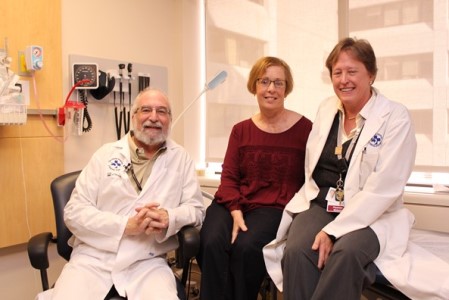Newsroom
Stem cell procedure sends patients with severe myasthenia gravis into remission
novembre 17, 2016

A stem cell procedure that reboots the immune system sent seven patients with a severe form of the autoimmune disease myasthenia gravis into long-term remission, according to a retrospective study published in JAMA Neurology.
In this disease the immune system interrupts the communication between the muscles and the nerves, which can make swallowing and breathing difficult. Most patients can be successfully treated with conventional therapies, but a few are resistant to them.
One of these is 58 year-old Anne Scott, who was on life support multiple times when the muscles controlling her breathing stopped working. Soon after undergoing the stem cell procedure in 2001, she was able to attend her daughter’s wedding and hold her first grandchild.
The study by Dr. Harold Atkins and his colleagues looked back on data from seven severe myasthenia gravis patients treated at The Ottawa Hospital with an intensive procedure which completely wipes out the immune system and then regenerates a new one using the patient’s own blood stem cells (autologous HSCT). All seven patients became free of symptoms and no longer needed treatment for myasthenia gravis.
While Dr. Atkins and colleagues have also tested this procedure for autoimmune diseases multiple sclerosis and stiff person syndrome, this is the first documented report of using it to treat myasthenia gravis.
The treatment can have serious side effects and risks, and would only be appropriate for a small proportion of people with severe myasthenia gravis who do not respond to conventional therapies. People who are interested in this therapy should speak with their own neurologist, who if appropriate can make a referral to the Blood and Marrow Transplant Program of The Ottawa Hospital.
Co-authors: Adam Bryant, Harold Atkins, Elizabeth Pringle, David Allan, Grizel Anstee, Isabelle Bence-Bruckler, Linda Hamelin, Michael Hodgins, Harry Hopkins, Lothar Huebsch, Sheryl McDiarmid, Mitchell Sabloff, Dawn Sheppard, Jason Tay, Christopher Bredeson.
Funders: This study did not have dedicated funding, but all researchers at The Ottawa Hospital are supported by The Ottawa Hospital Foundation.
The Ottawa Hospital: Inspired by research. Driven by compassion
The Ottawa Hospital is one of Canada’s largest learning and research hospitals with over 1,100 beds, approximately 12,000 staff and an annual budget of over $1.2 billion. Our focus on research and learning helps us develop new and innovative ways to treat patients and improve care. As a multi-campus hospital, affiliated with the University of Ottawa, we deliver specialized care to the Eastern Ontario region, but our techniques and research discoveries are adopted around the world. We engage the community at all levels to support our vision for better patient care. See www.ohri.ca for more information about research at The Ottawa Hospital.
University of Ottawa
The University of Ottawa is home to over 50,000 students, faculty and staff, who live, work and study in both French and English. Our campus is a crossroads of cultures and ideas, where bold minds come together to inspire game-changing ideas. We are one of Canada’s top 10 research universities—our professors and researchers explore new approaches to today’s challenges. One of a handful of Canadian universities ranked among the top 200 in the world, we attract exceptional thinkers and welcome diverse perspectives from across the globe. www.uottawa.ca
For further information, please contact
Amelia Buchanan
Senior Communication Specialist
Ottawa Hospital Research Institute
Office: 613-798-5555 x 73687
Cell: 613-297-8315
ambuchanan@ohri.ca
